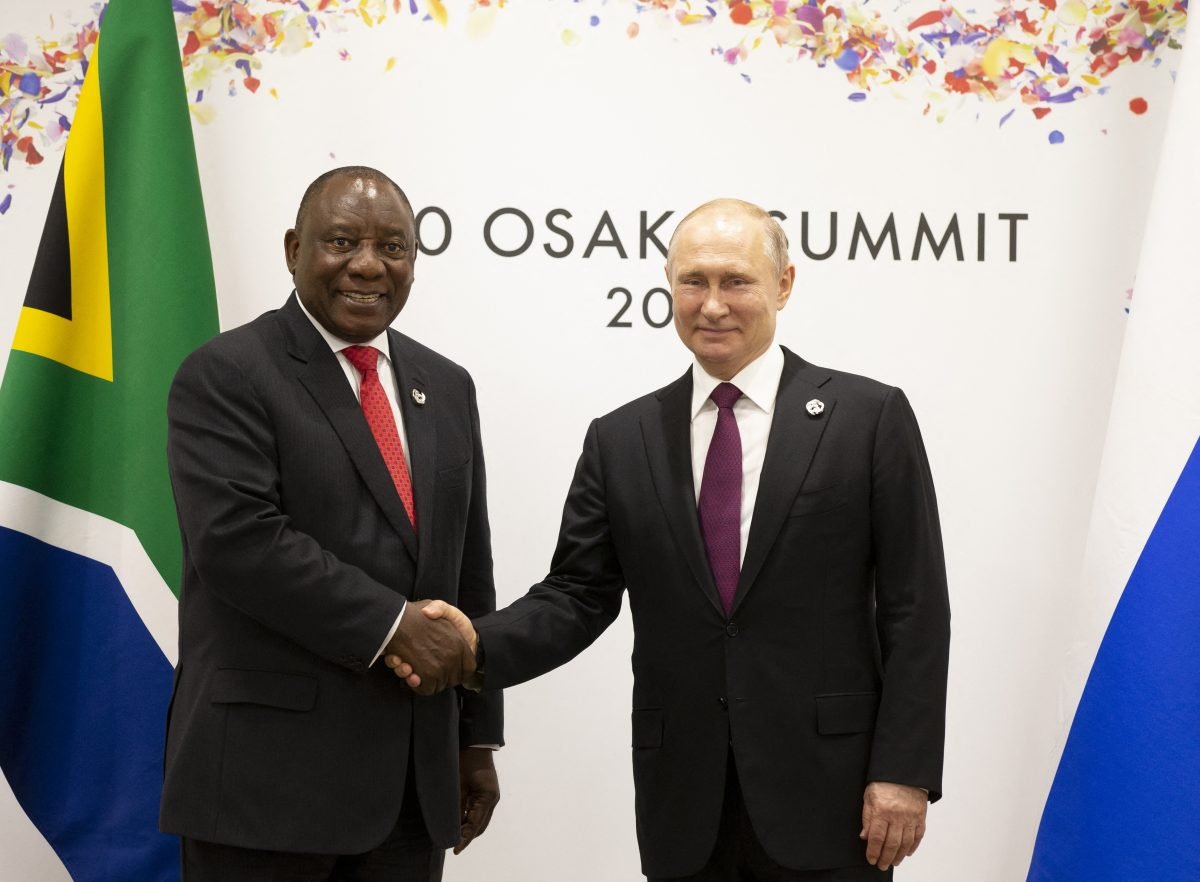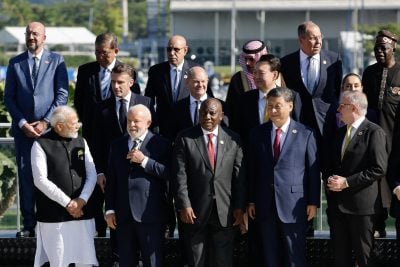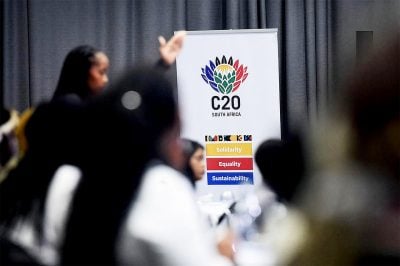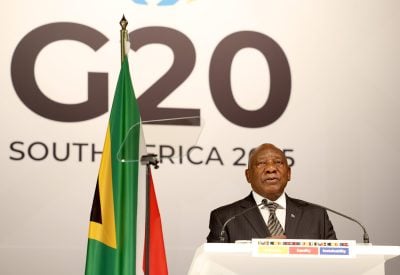As South Africa prepares to host the 15th BRICS Summit in August, it faces a significant challenge in its international relations. If all the leaders of the emerging economies – Brazil, Russia, India, China and South Africa – attend, should South Africa arrest Russian President Vladimir Putin?
On 17 March the International Criminal Court (ICC) issued an arrest warrant for Putin. It alleges that he, along with Maria Lvova-Belova, the Russian Federation’s commissioner for children’s rights, transferred Ukrainian children from occupied regions and areas controlled by Russia during the war. According to the Ukrainian government, 16,226 children have been deported to Russia, mainly from orphanages, summer camps, and boarding schools.
The Russian authorities claim that they transferred the children for adoption by Russian families and for their “re-education”, but this allegation violates the Fourth Geneva Convention. The ICC arrest warrant, therefore, plays a critical role in addressing these allegations. The conflict between Russia and Ukraine has been ongoing since 2014, with the annexation of Crimea by Russia and the subsequent separatist movements in eastern Ukraine. The Ukrainian National Police have opened over 68,000 cases related to the crimes committed by invading Russian forces in Ukraine.
South Africa’s legal obligations
South Africa is obligated under both international and domestic law to arrest Putin and hand him over to the ICC if he decides to travel to South Africa for the 15th BRICS Summit in Johannesburg from 22 to 24 August 2023.
Article 27 of the Rome Statute of the International Criminal Court states that an “official capacity as a Head of State or Government, a member of a Government or parliament, an elected representative or a government official shall in no case exempt a person from criminal responsibility.” Therefore, the ICC can prosecute even sitting heads of state.
However, some may argue that enforcing the warrant could damage South Africa’s relationship with Russia or that the ICC unfairly targets certain countries. It is important to consider the gravity of the allegations against Putin and the potential consequences of allowing him to travel freely without fear of arrest. It is also worth noting that South Africa has previously failed to arrest Omar al-Bashir, who had an ICC arrest warrant against him when he visited the country as president of Sudan in 2015, due to political considerations.
The government’s failure to surrender al-Bashir was held to be inconsistent with South Africa’s obligations under both international and domestic law, and therefore unlawful. South Africa risks facing similar legal consequences if it fails to comply with the ICC’s warrant for Putin’s arrest.
While it is understandable that some may be concerned about the political implications of arresting Putin, South Africa has a responsibility to uphold the rule of law and fulfil its obligations under international and domestic law. Failure to do so would not only be unlawful, but it could also damage South Africa’s reputation as a democratic nation that upholds the principles of justice and accountability.
South Africa’s interests
The BRICS union was established in 2009 to promote collaboration in trade, finance, and development among emerging economies. Its primary objective was to create a united front against developed economies, particularly the United States and the European Union, which dominated the global financial system. The BRICS union represents over 40% of the world’s population and more than a quarter of its GDP.
South Africa’s inclusion in the BRICS was significant because it serves as a gateway to the rest of the African continent, which offers immense untapped potential for trade, investment, and development. Additionally, South Africa’s membership was seen as a recognition of its social and political stability.
Maintaining good relations with BRICS member states is a high priority for South Africa, according to Naledi Pandor, its minister of international relations and cooperation. Arresting Putin could be disruptive to South Africa’s foreign policy, particularly with regard to Russia and China.
While China is South Africa’s largest trade partner, Russia and South Africa have a longstanding relationship that spans several decades, collaborating in various fields such as defence, technology, and energy. Apart from these areas, both countries share a common interest in promoting a multipolar world order and expanding their influence on the global stage.
It is noteworthy that the South African government has adopted a neutral stance regarding the conflict between Russia and Ukraine, maintaining that Russia is still a partner and expressing interest in engaging with all BRICS member states to further cooperation within the union.
The arrest of Putin, should it occur, could signal South Africa’s commitment to upholding the rule of law and human rights and promote a more level playing field for all BRICS members. However, it could also trigger a diplomatic crisis between South Africa and Russia and have economic repercussions for South Africa, as Russia is a significant investor in the country’s mining and energy sectors.
Furthermore, the BRICS union is founded on principles of non-interference in each other’s internal affairs, and the arrest of Putin could be perceived as a violation of this principle. South Africa would need to carefully weigh the potential benefits and risks of such an action and consider alternative ways of upholding the rule of law and human rights without jeopardising its foreign relations and economic interests.
Questioning the ICC’s legitimacy
The pressure on South Africa to enforce the ICC arrest warrant on Putin also brings to light the controversial nature of the ICC itself.
The ICC has been accused of having a bias against Africa, with many of its prosecutions focused on African countries and leaders. This has led to concerns about the legitimacy of the institution, as it appears to be targeting one region of the world while ignoring other regions where similar crimes are being committed.
Furthermore, the fact that several major global powers, including the United States, China, India, Pakistan, and Indonesia, have not joined the ICC, also raises questions about its legitimacy. Without the participation of these countries, which represent more than half of the world’s population, the ICC’s reach and effectiveness are limited.
Another issue that has raised concerns about the ICC’s legitimacy is its perceived bias towards Western powers. The ICC has been criticised for not prosecuting Western countries, particularly the United States and its allies, for their actions in Iraq and other conflicts. This has led some to question whether the ICC is truly a neutral institution that applies the rule of law equally to all countries.
Despite these criticisms, it is important to acknowledge that the ICC has had some successes in prosecuting war crimes and crimes against humanity, such as the recent conviction of Dominic Ongwen, a former Ugandan rebel leader. The ICC has also played a critical role in promoting accountability for grave international crimes and providing justice for victims of human rights violations.
Nevertheless, it is important for the ICC to address the concerns about its legitimacy to ensure that it is perceived as a fair and impartial institution. This can be done through reforms to its mandate and governance, as well as by increasing its reach and effectiveness in other regions of the world. Additionally, the ICC should work to address the criticisms of selective prosecution and bias, by holding all countries to the same standards of accountability.
Overall, the question of the ICC’s legitimacy is a complex and multifaceted issue that requires careful consideration. While the ICC has had its successes, it is important for the institution to address the concerns about its bias and limited reach to ensure that it is seen as a legitimate mechanism for promoting justice and accountability on a global scale.
Conclusion
The BRICS summit presents a unique challenge for South Africa. The country must balance its legal obligations and economic and strategic interests within the union. It is essential to seek support from other ICC member states and engage in dialogue with BRICS members to promote reforms in the ICC’s mandate and governance. This approach could help address concerns of selective prosecution and bias while ensuring all countries are held to the same standards of accountability.
South Africa’s decision on whether to enforce the ICC arrest warrant against Putin will test its commitment to the rule of law and human rights. Prioritising strategic interests over obligations and legitimacy could have severe consequences for South Africa’s global reputation and commitment to justice. Finding a delicate balance between its obligations, interests, and legitimacy will be crucial to maintaining its moral standing in the global community. Ultimately, it is necessary to uphold the rule of law and human rights while also maintaining diplomatic relationships with fellow BRICS member states.
Related articles
Want to continue reading? Subscribe today.
You've read all your free articles for this month! Subscribe now to enjoy full access to our content.
Digital Monthly
£8.00 / month
Receive full unlimited access to our articles, opinions, podcasts and more.
Digital Yearly
£70.00 / year
Our best value offer - save £26 and gain access to all of our digital content for an entire year!

 Sign in with Google
Sign in with Google 



